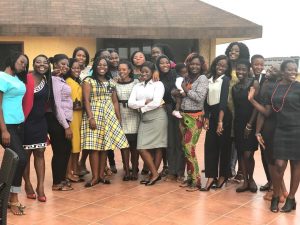YOUNG WOMEN URGED TO INCREASE ADVOCACY ON REPORTING VIOLENCE AGAINST WOMEN AND GIRLS

 The Gender Studies and Human Rights Documentation Centre (Gender Centre) organized a three day residential training workshop on Sexual Reproductive Health and Rights (SRHR) and its links to Violence against Women and Girls (VAWG). The training was held from 25th – 27th September, 2018 under the project entitled “Community – based approach to Combating Violence against Women and Girls (VAWG) in Ghana, Uganda, South Africa and Mozambique.
The Gender Studies and Human Rights Documentation Centre (Gender Centre) organized a three day residential training workshop on Sexual Reproductive Health and Rights (SRHR) and its links to Violence against Women and Girls (VAWG). The training was held from 25th – 27th September, 2018 under the project entitled “Community – based approach to Combating Violence against Women and Girls (VAWG) in Ghana, Uganda, South Africa and Mozambique.
The meeting brought together 20 young women from a coalition of CSOs/NGOs working on VAWG, to develop their leadership capacity for a comprehensive response to VAWG in Ghana, advocate for increased services for victim/ survivors, and bring an end to impunity and improved state accountability. Participating organisations included Curious Minds, Network for Women’s Rights, Women in Law and Development in Africa (WILDAF), Foundation for Female Photojournalists and University of Ghana Young Women in Leadership Club.
The training also sought to help the young women advocate for increased access to justice as it is linked to SDG 5, which speaks to the need to “Adopt and strengthen sound policies and enforceable legislation for the promotion of gender equality and the empowerment of women and girls at all levels”.
In her welcome address, the Project Officer for Gender Studies & Human Rights Documentation Centre; Rosemary Yaa Dufie stated that this was the second phase of the training. According to her, the training is a collaboration between Gender Centre, the Norwegian Agency for Development Cooperation (NORAD), and Masimanyane which is being carried out in four (4) countries namely South Africa, Ghana, Mozambique and Uganda. The objectives of the training was to enlighten young women on the various forms of violence against women and girls and also provide them with regional and international platforms which will enable the young feminists to share ideas and learn from one another.
Facilitators for the training Nwabisa Dlova and Thabisa Myataza, both from Masimanyane encouraged participants to continue their advocacy activities in their various organisations. This can be done through storytelling and focused group discussions. In addition, they mentioned that young women are not the same as a result different measures should be used for different groups of people when treating SRHR issues. Also, advocates need to correct the environment that marginalizes people. At the end of the training participants put together an advocacy strategy which they will use to address the various instances of SRHR. They also encouraged participants to remind their governments about their commitments made to international and regional policies such as the Convention on the Elimination of Violence Against Women (CEDAW), The Maputo Protocol and the Sustainable Development Goals (SDGs).
Lilly Oseyda Jay
Communications and Advocacy Manager,
CYIB-Curious Minds
